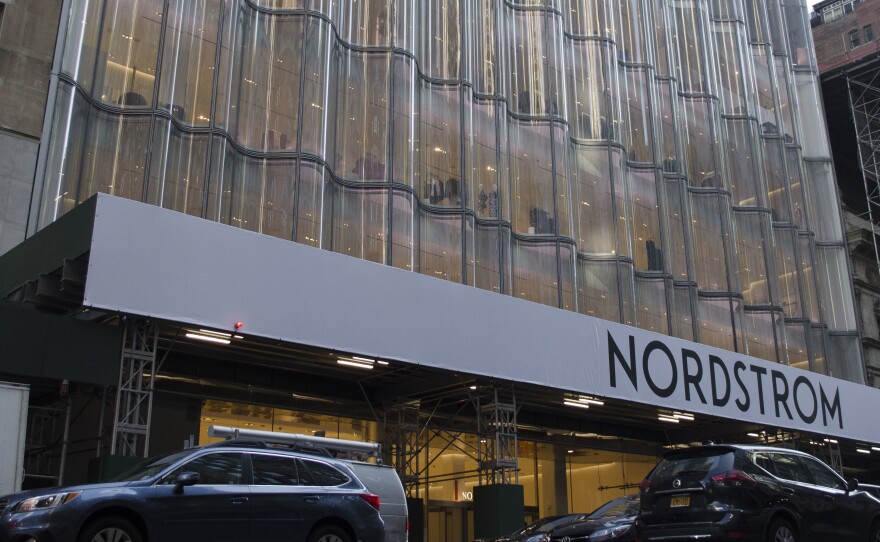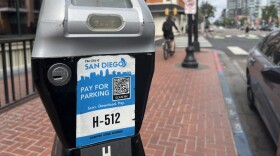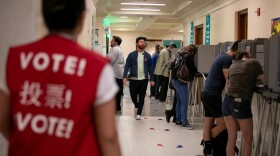In one corner of Nordstrom's new flagship store in New York City, interlocking Burberry logos covered every surface. Dramatic string music played. And beyond the merchandise, a small cafe doused in bright pink seemed to be just waiting for someone to pose for a photo.
"No professional photographs," a spokesperson guiding members of the press through the store said. "But social photos are OK."
The future of retail brings to mind loud, online brands reaching Gen Z kids through Instagram ads, pop-up shops and decked-out influencers. But Nordstrom, the traditional luxury retailer, sees opening a massive store in one of its largest markets as the way forward.
Nordstrom will open its 320,000-square-foot store Thursday on 57th Street and Broadway. Designed to "reflect the spirit of the city," as the company says, the store has seven floors of products and services alongside in-store restaurants and bars.
"If you want to be known as a top retailer in North America, you pretty much have to be in New York," said Peter Nordstrom, the company's co-president.
The store is a big investment at an uncertain time for retailers. The luxury department chain Barneys is closing stores throughout the country, putting even its iconic Manhattan Madison Avenue location in trouble. Last month, Forever 21 filed for bankruptcy and plans to close as many as 178 stores.
Traditional retailers face fast-changing consumer habits, rising rents and a large amount of online-only businesses taking sales away from big-box stores. But physical stores aren't dead.
"Yes, stores are closing and retailers are consolidating the number of stores they have but that is just a response to changing consumer behaviors," said Michael Brown, an analyst at consulting firm A.T. Kearney.
Physical stores are still a critical part of a retailer's strategy, Brown said. He said 75% of retail sales still take place in stores, and 90% of "consumer journeys," the process customers go through before making a purchase, include an interaction with a store.
Nordstrom also opened two other stores last month in New York. Called Nordstrom Local, the smaller stores don't stock clothes but offer in-store pickup for items purchased online alongside free consultations with stylists. The retailer's increased presence in New York is an attempt to duplicate the success it found in Los Angeles.
The company has been tweaking its strategy in Los Angeles this year through Nordstrom Locals by making up to seven times more inventory available for next-day pick up. According to Nordstrom's second-quarter report, this contributed to sales nearly tripling in July for buy-online, pick-up-in-store purchases.
On an August earnings call with investors, Erik Nordstrom, the company's co-president, said customers spent 2 1/2 times more than average at Nordstrom Locals in Los Angeles. He said the company sees its stores not only as places to sell products but also to engage customers.
"We really don't care where the sale gets rung up," he said.
Online-only brands are often seen as a scourge to traditional brands that rely on physical stores. But Brown, the analyst, said much of the hype around these companies comes from their loud presence and heavy media coverage.
And increasingly, brands born online — like Warby Parker, Bonobos and Untuckit — have been opening their own physical stores. When these businesses open stores, they find that their online sales go up, Brown said.
"It's a large billboard for the business that gets more eyeballs than what it takes online through pop-up ads and banner ads and all the other very expensive media," he said.
Beyond marketing, Nordstrom executives also point to the services their stores offer as a strength. They're not new or necessarily directed at the next generation of consumers, but services like denim customization, facials, personal stylists and alterations simply can't be offered online.
In an increasingly online world, Nordstrom still finds value in the real one.
Peter Talbot is an intern on the NPR Business Desk.
Copyright 2019 NPR. To see more, visit https://www.npr.org.






